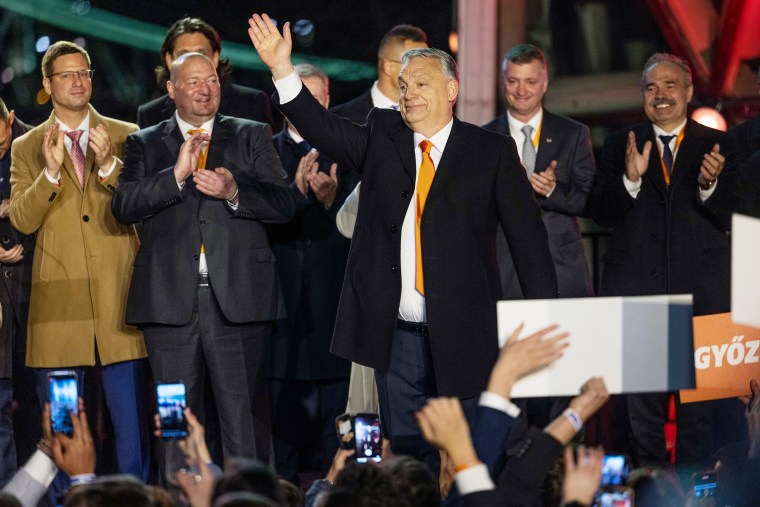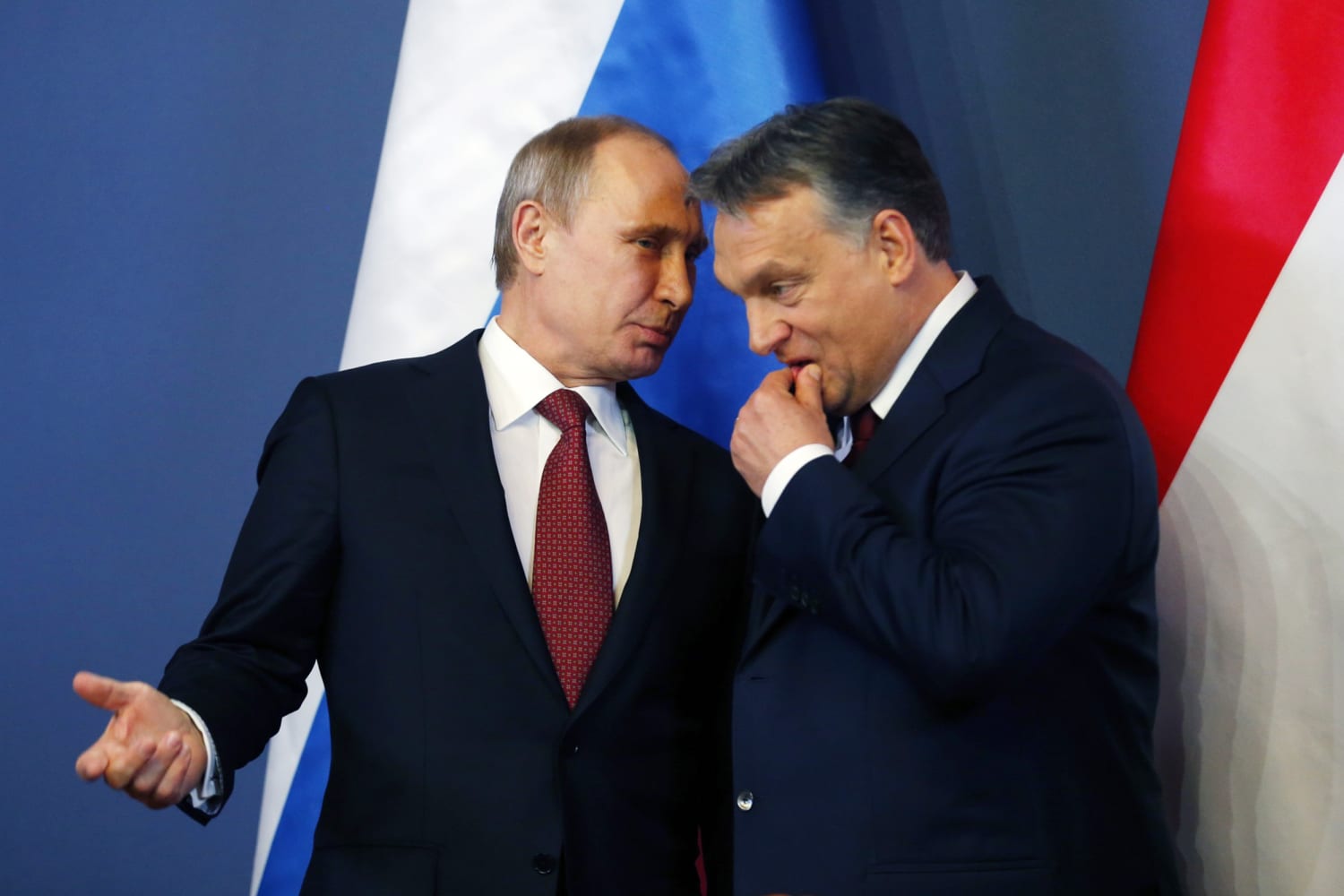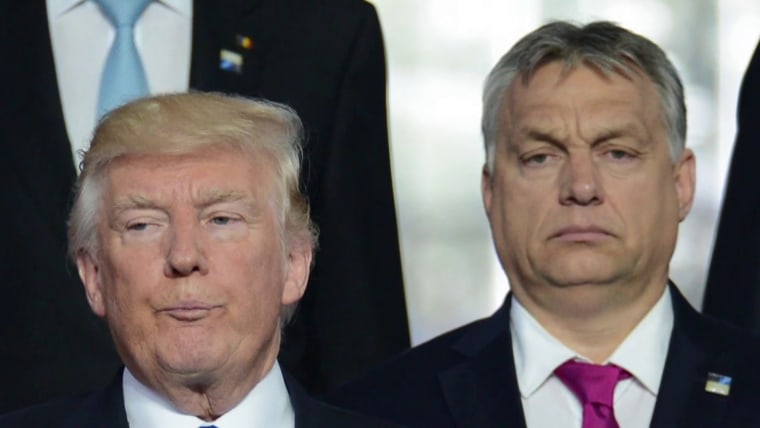Hungary’s far-right prime minister, Viktor Orbán, celebrated his win of a fourth four-year term Sunday by exulting that his victory was “so big that you can see it from the moon, and you can certainly see it from Brussels,” home to the European Union — or, for that matter, from Washington, Kyiv and Moscow.
It’s clear that Orbán feels armor-plated against anything Brussels or even Washington can bring on.
Of all the heads of the 27 members of the E.U., Hungary’s populist leader maintains by far the friendliest ties with Russian President Vladimir Putin, even during the worst of the war in Ukraine. Yet he held on to his job with what looks like an all-but-unassailable two-thirds supermajority in the National Assembly. A coalition of six disparate parties could manage no more than a third of the vote. Even their standard-bearer, the telegenic Péter Márki-Zay, the mayor of the city where he stood for election Sunday, was defeated by an Orbán loyalist for a seat in parliament.
How is all that possible in the wake of appalling images like those surging out of Ukraine, along with the nearly 400,000 Ukrainian refugees pouring across the 80-plus-mile frontier Hungary shares with Ukraine? There are several reasons for Orbán’s victory — all of which should be quite chilling for the E.U. and for Washington as they consider how to deal with this latest challenge to the heart of Western democracy.
First, like his role model, Putin, Orbán has seized all but unassailable control over the nation’s media — print, radio, television. This has helped him skew the narrative of the Russian invasion of Ukraine, emphasizing that his country’s ties with the Kremlin are all that are preventing the country from being sucked into the conflict.

Orbán’s hold can’t be explained entirely by his mastery of the media or his manipulation of political levers, however. Until the pandemic arrived, Hungary enjoyed one of the fastest economic growth rates in Europe, while unemployment shrank dramatically beneath the umbrella of low corporate tax rates. Migrants, who might have usurped jobs from Hungarians, were held at bay, justified as part of the high Christian values of which Orbán has styled himself the defender and which appeal to many Hungarians, especially in the countryside, where Orbán draws a lot of his strength.
And though Hungary has a long history of antagonism with Russia, coming out of the Hungarian Revolution, suppressed by Russian tanks in 1956, the legacy of the leader the Soviets installed, János Kádár, also endures. He promptly instituted “goulash communism,” meaning “don’t challenge the basic foundations of the power of the Kremlin and you can lead quite comfortable lives.” As I saw from my time reporting on Moscow’s “satellites,” Hungary effectively became the freest and most prosperous, and Orbán has embraced that memory to make his ties with Putin politically palatable.
The upshot for the West is that it will continue being forced to deal with a nation that refuses to allow the transit of any military supplies or equipment across Hungary to Ukraine or to participate in oil and gas sanctions against the Kremlin. Hungary enjoys prices one-fifth of those in the rest of Europe under a long-term contract that Putin and Orbán boasted about during a Kremlin visit in February, an economic perk Orbán isn’t eager to forfeit for his voters. Though in a pre-vote nod to any moderates in the electorate, Hungary did say it wouldn’t exercise a veto over other E.U. sanctions of Russia.
Orbán has long been Europe’s odd man out. In 2015, when the rest of Europe banded together to receive a wave of Middle Eastern immigrants as Syria was coming apart, Orbán chose instead to build a wall preventing any from entering Hungary — a $106 million, 13-foot-tall chain-link fence topped by rows of razor wire, stretching the length of the 110-mile border dividing Hungary from neighboring Serbia. It was as determined a statement as possible that Orbán would be separating himself from the rest of Europe.
In Serbia itself, fellow Kremlin-friendly populist strongman Aleksandar Vučić also won elections Sunday, so the two now form a unique and pernicious bloc in southeastern Europe. Hungary is increasingly retreating from the spirit of NATO, even if it remains a part of the alliance in name. And Serbia had aspired to membership in the E.U., but its bid has stalled as it drifts increasingly away from the European mainstream.
The first words uttered by Orbán as he basked in the glow of an overwhelming victory were attacks on all his adversaries at home and abroad. He even attacked the West’s darling, Ukrainian President Volodymyr Zelenskyy, who has called Orbán’s administration “a Russian branch in Europe.”
It’s clear that Orbán feels armor-plated against anything Brussels or even Washington can bring on. He’s already withstood an Article 7 vote in the European Parliament “censuring” Hungary for failure to adhere to the E.U.’s core values. As a result, the E.U. recently said it would freeze some subsidies to the country.
The broader problem of Orbán’s win is the cleavages that it shows are alive and well in Europe. While the Ukraine invasion led to a unified and swift stand against Russia unprecedented since the Cold War, Orbán’s victory shows it’s not enough for all of Europe to reject leaders who lean toward authoritarianism.
So there is potentially more trouble ahead for any number of countries that have their own populist, right-wing political forces. French voters will go to the polls Sunday in the first round of presidential elections with two right-wing candidates, Marine Le Pen and Éric Zemmour, challenging incumbent Emmanuel Macron, whose lead has narrowed in recent days.
In Italy, Orbán continues to maintain a close relationship with Matteo Salvini of the far-right Italian League. Orbán has also cultivated ties with some sympatico Americans, including Fox News personality Tucker Carlson. The TV host even flew to Hungary last summer to support the prime minister (though he lost some credibility when he mistakenly referred on Fox News to neighboring Serbia as Slovakia, much to the amusement of Hungarian media).
The cracks in Europe still remain — and threaten to widen — as authoritarian leaders who drew support, or at least inspiration, from Putin haven’t been cowed by how badly his war is going or by European democracies’ newfound resolve. Perhaps the best strategy for the West is simply containment. Even if funding freezes don’t guarantee change, steps like these send the strong message that authoritarianism is quarantined where it has taken hold, while the perils of spread are clearly spelled out to voters in what is still left of the democratic West. Then the hold on power of these leaders, isolated and fragmented, perhaps will begin to rot from the roots.
Source: | This article originally belongs to Nbcnews.com










